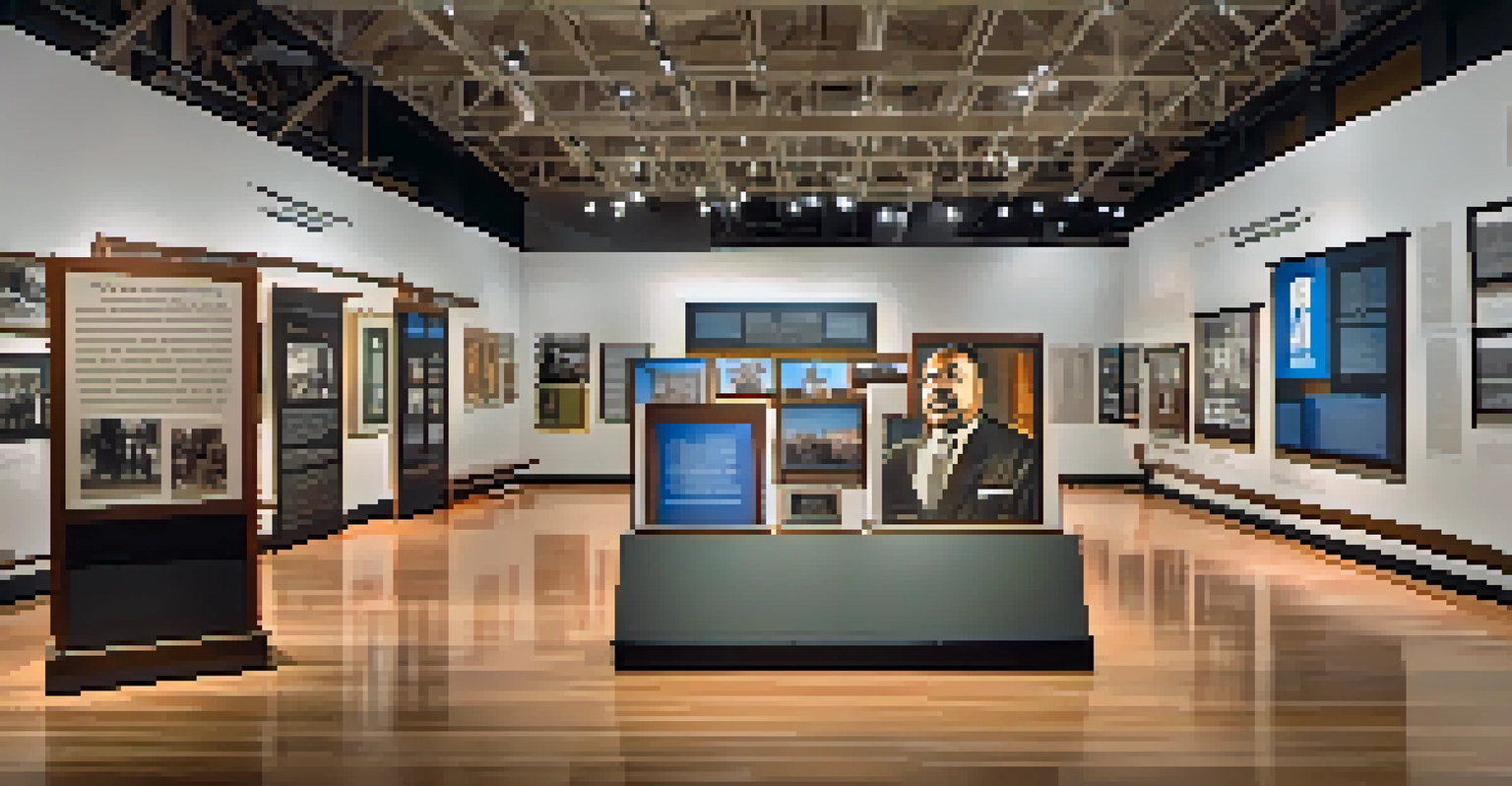The Legacy of the Lorraine Motel: Remembering Dr. King

The Lorraine Motel: A Historic Landmark in Memphis
The Lorraine Motel, located in Memphis, Tennessee, serves as a poignant reminder of the civil rights movement. Built in the 1920s, it originally catered to African American travelers during a time of widespread segregation. Today, it stands as a symbol of hope and resilience, attracting visitors from around the world who seek to understand the struggles for equality.
Injustice anywhere is a threat to justice everywhere.
In 1968, the Lorraine Motel became infamous as the site of Dr. Martin Luther King Jr.'s assassination. This tragic event marked a turning point in American history, igniting a renewed commitment to civil rights. The motel's transformation into the National Civil Rights Museum allows visitors to reflect on this dark chapter while honoring the legacy of Dr. King.
The preservation of the Lorraine Motel is crucial for educating future generations about the civil rights movement. By visiting this site, individuals can gain insights into the challenges and triumphs of those who fought for justice. The motel not only memorializes Dr. King's life but also emphasizes the ongoing struggle for equality.
Dr. King’s Final Days and Their Significance
In the days leading up to his assassination, Dr. King was deeply involved in advocating for economic justice and workers' rights. His commitment to the Memphis sanitation workers' strike showcased his understanding that civil rights extended beyond racial equality. Dr. King believed that fighting for economic equity was essential in the broader struggle for social justice.

On April 4, 1968, Dr. King was struck down while standing on the balcony of the Lorraine Motel. This moment shocked the nation and prompted an outpouring of grief and anger. The impact of his death reverberated far beyond Memphis, leading to protests and riots in cities across the country, highlighting the urgency of the issues he championed.
Lorraine Motel: A Symbol of Hope
The Lorraine Motel stands as a poignant reminder of the civil rights movement and the ongoing struggle for equality.
Dr. King’s assassination serves as a reminder of the risks faced by those who fight for justice. His legacy continues to inspire activists striving for change today. By reflecting on his final days, we can better understand the importance of his message and the work that still lies ahead.
The National Civil Rights Museum: A Place of Reflection
The National Civil Rights Museum, built around the Lorraine Motel, provides a comprehensive overview of the civil rights movement. Through engaging exhibits and multimedia presentations, visitors can explore the historical context of Dr. King's activism. The museum brings to life the struggles faced by countless individuals fighting for equality.
Life's most persistent and urgent question is, 'What are you doing for others?'
One of the most powerful aspects of the museum is its ability to connect past events with contemporary issues. As visitors walk through the exhibits, they are encouraged to reflect on their own roles in advocating for justice today. This connection fosters a deeper understanding of the ongoing fight for civil rights.
By visiting the museum, individuals not only honor Dr. King's legacy but also commit to continuing his work. The museum serves as a catalyst for conversations about race, equality, and justice, urging society to confront uncomfortable truths. In this way, the Lorraine Motel and the museum work together to inspire action and change.
Dr. King’s Ideals: A Blueprint for Future Generations
Dr. King's vision of a just society is as relevant today as it was during the civil rights movement. His principles of nonviolence, love, and unity continue to resonate with those advocating for change. By embracing these ideals, individuals can work towards a more equitable future while honoring his memory.
Education plays a vital role in preserving Dr. King's legacy. Schools and organizations can incorporate his teachings into curriculums and programs, inspiring young people to take up the mantle of activism. By instilling these values in future generations, we ensure that his message endures.
Dr. King's Legacy Inspires Action
Dr. King's ideals of nonviolence and unity continue to resonate, motivating current and future generations to advocate for justice.
Moreover, Dr. King's belief in collective action emphasizes the power of community in driving change. As individuals come together to fight for justice, they create a ripple effect that can transform society. By embodying his ideals, we can forge a path toward a brighter future for all.
Commemorating Dr. King: Events and Remembrances
Each year, numerous events are held to honor Dr. King's legacy, especially around the anniversary of his assassination. These events provide opportunities for reflection, education, and activism. From marches to panel discussions, they encourage participants to engage with the ongoing fight for civil rights.
Organizations across the country host community service projects in Dr. King's name, embodying his belief in service to others. These acts of kindness not only honor his memory but also promote unity and understanding within communities. By giving back, individuals can make a tangible impact on their neighborhoods.
Additionally, memorials and art installations dedicated to Dr. King serve as powerful reminders of his impact. These tributes invite people to reflect on his contributions to society and inspire them to continue advocating for justice. Through these commemorations, Dr. King's legacy lives on, encouraging us to strive for a better world.
Continuing the Conversation: The Importance of Dialogue
Engaging in conversations about race and inequality is essential for progress. Dr. King advocated for open dialogue as a means of fostering understanding and empathy. By discussing these challenging topics, we can break down barriers and work toward a more inclusive society.
Community forums, workshops, and online discussions provide platforms for individuals to share their experiences and perspectives. These exchanges can spark meaningful change and encourage collaboration among diverse groups. As we listen to each other, we can find common ground and develop solutions to pressing social issues.
Importance of Dialogue for Change
Engaging in open conversations about race and inequality is essential for fostering understanding and driving meaningful societal progress.
Moreover, the legacy of Dr. King reminds us that dialogue is just one part of the equation. Action is equally important. By translating conversations into tangible efforts, we can honor his memory and contribute to the ongoing fight for justice and equality.
The Ongoing Relevance of Dr. King's Message
The ideals championed by Dr. King remain relevant in today’s world, where inequalities and injustices persist. Issues such as racial profiling, economic disparity, and access to education continue to affect marginalized communities. Recognizing these challenges allows us to understand the ongoing relevance of his message.
Activists today draw inspiration from Dr. King's teachings as they strive to create a more equitable society. Movements aimed at social justice, police reform, and economic equality echo his commitment to nonviolence and equality. By channeling his spirit, contemporary activists keep his legacy alive.

In conclusion, the Lorraine Motel and Dr. King’s legacy serve as reminders of the work still needed to achieve true equality. By reflecting on his life and teachings, we can empower ourselves to take action and inspire future generations to continue the fight. Dr. King’s dream is not yet fully realized, but together, we can work towards making it a reality.